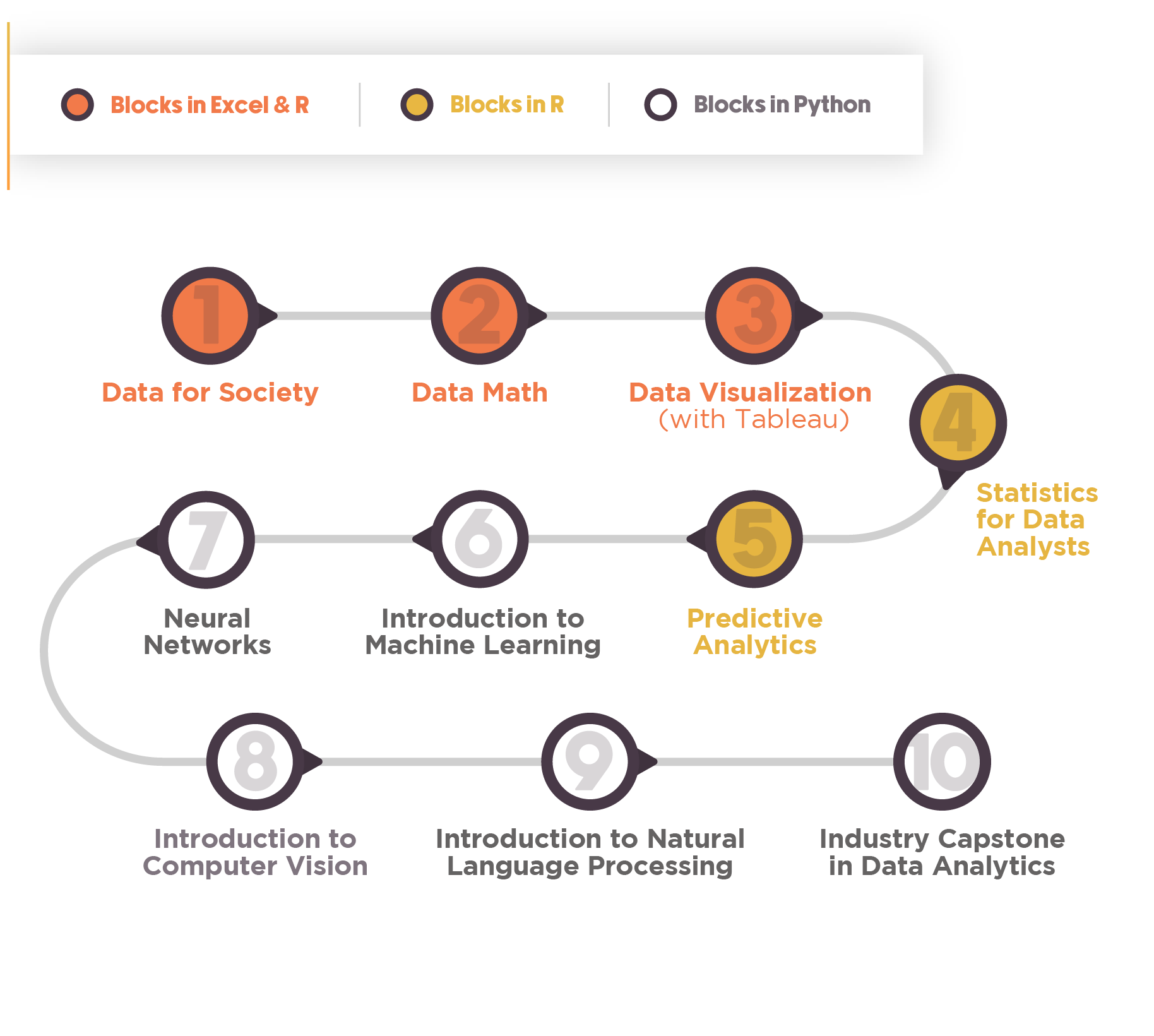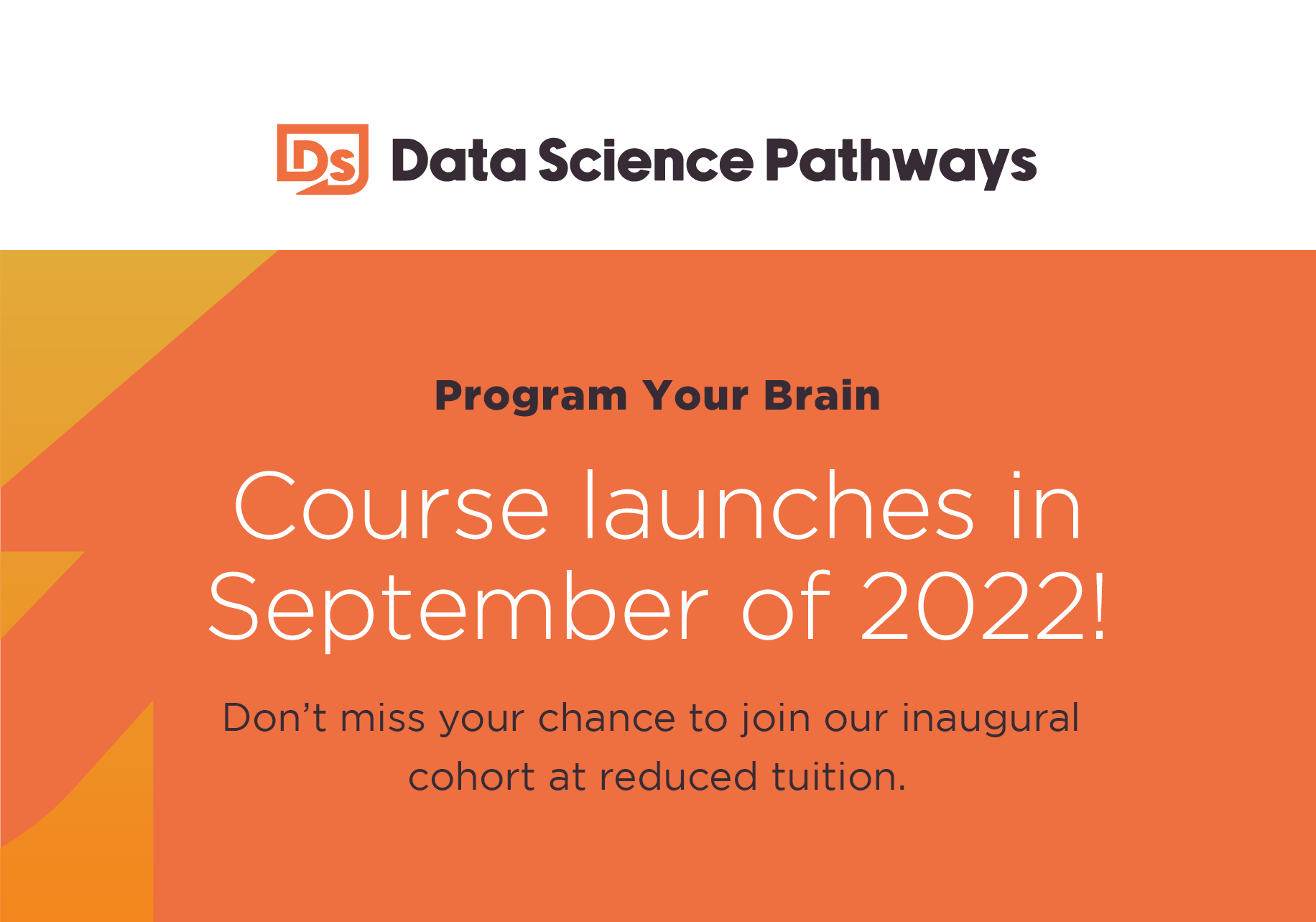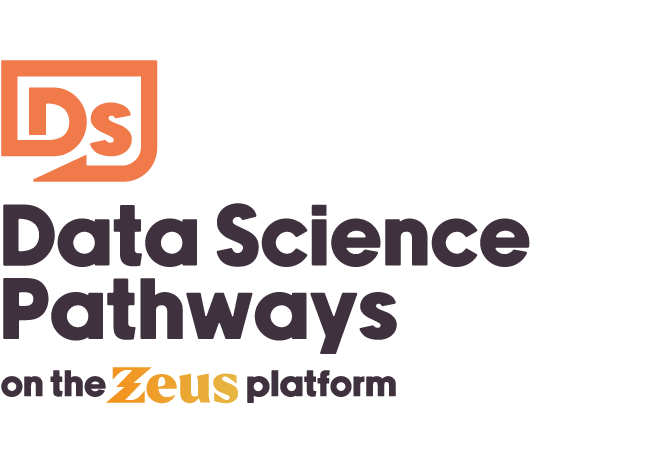DS Course Details

Data Science Pathways Overview:
- This course is comprised of 10 blocks, with a pathway to credit at the end of each block.
- Even if your goal is not earning a certification, this course is a great way to brush up on your existing data science skills. Try Block 1 and see what you think!
- Blocks can be taken in any order, although sequential order is highly recommend.
- All 10 blocks must be completed to earn the Texas State University System Professional Certificate.
- Upon completion, working age Texans with at least 60 hours of college credit, or professionals with on-the-job experience, can take a comprehensive DASCA exam to earn an additional certification from DASCA. It is the Professional ‘ABDA™’ Certification (Associate Big Data Analyst Certification™) (not required)
- There are potential pathways to credits in many academic programs at participating universities.
- For additional questions, check out our FAQs.
Course Structure

Curriculum Breakdown By Block
-
1. Data for Society
Language:
Excel & RFaculty Members:
Dr. Tahir Ekin, CIS & QM (Initial Cohort, Sept. 5)
Dr. Barbara Hewitt, HIM (Initial Cohort, Nov. 7)
Dr. Li-Jen Lester, Computer Science (Initial Cohort, Jan. 9)
Dr. Amar Rasheed, Computer ScienceCourse Description:
This course provides an explanation of the big picture goals of the certificate and explains how the modules prepare one to achieve those objectives. It identifies the roles, functions, applications and importance of data science. It defines data types and describes data analytics frameworks. It covers big data analytics with a discussion of the curse of dimensionality and cloud-based systems. It concludes with an overview of societal and ethical implications of big data analytics, and the role of privacy and transparency in analytics.Recommended:
This intro block has no prerequisites. -
2. Data Math
Language:
Excel & RFaculty Members:
Dr. Francis Méndez, CIS & QM (Initial Cohort, Nov. 7)
Dr. Alex White, Mathematics (Initial Cohort, Jan. 9)
Dr. Melinda Holt, StatisticsCourse Description:
For higher-level courses in data science, it is convenient to review basic mathematical concepts. The objective of this learning block is to build an intuitive understanding of the underlying mathematics of data science. The zero module covers a basic introduction to R language. The first module shows the mathematics of optimization. It introduces calculus techniques and the use of matrices. Matrices are discussed in detail in the linear algebra modules. The second module introduces linear algebra and how it relates to data science. The mathematics of vectors and matrices are discussed. The third module introduces the mathematics of probability theory and how it relates to data science. The fundamental concept of probability distribution is discussed. The fourth module demonstrates how calculus, matrix algebra and probability are used in typical data science applications.Recommended:
Functional knowledge of all previous blocks. -
3. Data Visualization
Language:
Excel & RFaculty Members:
Dr. Fereshteh Zihagh, Marketing (Initial Cohort, Jan. 9)
Dr. Diane Dolezel, HIM
Dr. Vung Pham, Computer ScienceCourse Description:
This course prepares individuals to organize and derive meaning from data by using visual presentation tools and techniques. This course includes topics related to data visualization theory, visual designs, evaluations of visual designs, and visualization application programming.Recommended:
Functional knowledge of all previous blocks. -
4. Statistics for Data Analytics
Language:
RFaculty Members:
Dr. Emily Zhu, CIS & QM
Dr. Vera Loudina, Mathematics
Dr. Di Gao, Mathematics
Dr. DooYoung Kim, StatisticsCourse Description:
This course covers basic concepts and methods of descriptive and inferential statistics for data science. Topics include measures of central tendency and dispersion, probability distributions, sampling distributions, confidence intervals, hypothesis testing. The fundamental concepts of correlation, simple and multiple regression are discussed. The optional module provides basic ideas of Bayesian statistics with the real-world examples. All modules are designed to teach students how to perform statistical analysis using an open-source statistical language R within RStudio.
Recommended:
Functional knowledge of all previous blocks. -
5. Predictive Analytics
Language:
RFaculty Members:
Dr. Valles-Molina, Electrical Engineering
Dr. Dinçer Konur, CIS & QM
Dr. Min Kyung An, Computer ScienceCourse Description:
This predictive analysis block presents the key concepts, techniques, and code approaches for predictive modeling and visualization analysis. Students will be tasked to discuss, employ, apply, assess, and explain predictive-related topics, such as linear regression, time-series, ETC, ARIMA, and HTC modeling. The block includes an optional forecasting project module to help students understand the differences between forecasting and prediction analytics.
Recommended:
Functional knowledge of all previous blocks. -
6. Introduction to Machine Learning
Language:
PythonFaculty Members:
Dr. Tanzima Islam, Computer Science
Dr. Karpoor Shashidhar, Computer Science
Dr. Hyuk Cho, Computer ScienceCourse Description:
Machine learning is the art and science of designing algorithms and developing programs that can accomplish specific goals and objectives without explicit instructions. This course is a broad overview of machine learning and will encompass supervised and unsupervised learning including topics from regression, ensemble learning, kNN, kMeans, support vector machines and principal component analysis.Recommended:
Functional knowledge of all previous blocks. -
7. Neural Networks
Language:
PythonFaculty Members:
Dr. Chul-Ho Lee, Computer Science
Dr. Xiaoxi Shen, Mathematics
Dr. Fan Liang, Computer ScienceCourse Description:
This block covers the fundamental topics of neural networks. Topics include different types of neural networks such as multilayer perceptrons, convolutional neural networks and recurrent neural networks, optimization algorithms and techniques for neural networks, and autoencoders.
Recommended:
Functional knowledge of all previous blocks. -
8. Introduction to Computer Vision
Language:
PythonFaculty Members:
Dr. Vangelis Metsis, Computer Science
Dr. Masoud Moradi, Marketing
Dr. Qingzhong Liu, Computer Science
Dr. ABM Islam, Computer ScienceCourse Description:
This course covers fundamental topics of computer vision. Topics include elementary image operations and transformations, feature extraction, model fitting, object recognition, classification and tracking, deep learning, camera models and stereo vision.Recommended:
Functional knowledge of all previous blocks. -
9. Introduction to Natural Language Processing
Language:
PythonFaculty Members:
Dr. Apan Qasem, Computer Science
Dr. Emmanuel Alanis, Finance & Economics
Dr. Cihan Varol, Computer ScienceCourse Description:
This course covers fundamental topics of big data and natural language processing. Topics include Hadoop, MapReduce, pre-processing techniques, recurrent neural networks, n-gram, and Naïve Bayes.Recommended:
Functional knowledge of all previous blocks. -
10. Industry Capstone in Data Analytics
Language:
PythonFaculty Members:
Dr. Byron Gao, Computer Science
Dr. Damián Valles Molina, Electrical Engineering
Dr. Bing Zhou, Computer ScienceCourse Description:
This block prepares students with necessary knowledge and skills to conduct industry capstone projects in data analytics. Students will be guided and tasked with solving real-world big data analytical problems, employing practical skills in classification, clustering, frequent pattern mining, and advanced machine learningRecommended:
Functional knowledge of all previous blocks.

